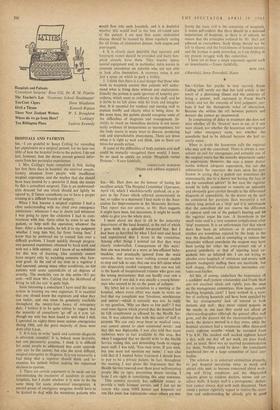Hospitals and Patients
'Consultant Surgeon,' Rene Gill, Dr. R. M. Pigache The Teacher's Lot 'Grammar School Headmaster'
Ten-Cent Cigars Drew Middleton Divil a Thram Kenneth Watson Three New Zealand Writers W. S. Broughton
Where do we go from Here? 'Lothbury'
Ten Rillington Place Ludovic Kennedy
HOSPITALS AND PATIENTS SIR,—I am grateful to Susan Catling for recording her experiences as a surgical patient, for we hear too little of how the hospital looks to the patient. I do not feel, however, that she draws correct general infer- ences from her particular experiences.
1. Mrs. Catling's basic complaint is that, during her first three days in hospital, she received unsatis- factory attention from people with insufficient surgical experience, and she implies that she should have been treated by a specialist (I think she means by this a consultant surgeon). This is an understand- able demand but one which should not lightly be agreed to, if future consultants are to have a proper training in a difficult branch of surgery.
When I first became a surgical registrar I had a clear understanding with my chief over emergency admissions: whenever I was in doubt and whenever I was going to open the abdomen I had to com- municate with him. Quite often he came to see the patient, or help with the operation, whatever the hour. After a few months, he left it to my judgment whether I rang him but, far from 'losing face,' I knew that he preferred me to consult him over a difficult problem. I learnt quickly through progres- sive personal experience, obtained by hard work and with not a little anxiety, and I know of no substitute for this way of learning. One certainly cannot learn surgery only by watching someone else, how- ever good. At the end of my time as a registrar I had operated, among many other conditions, on 600 patients with acute appendicitis of all degrees of severity. The mortality rate in this series-0.5 per cent.—will show Mrs. Catling that the likelihood of living `to tell the tale' is quite high.
Since becoming a consultant I have used the same system in training my own registrars. It is essential that one should know the registrars and what they can tackle, and one must be genuinely available throughout the twenty-four hours of emergency duty. I believe it to be quite untrue to suggest that the majority of consultants 'go off' at 6 p.m. (al- though my wife has been heard to wish that I did). I operated on eighty-three more serious emergencies during 1960, and the great majority of these were done after 6 p.m.
2. It is easy to write 'quick and accurate diagnosis is obviously essential.' It is, indeed, most desirable, but not necessarily possible, I think it is difficult for some people to understand that acute appendi- citis can be the easiest, but also the most difficult, surgical emergency to diagnose. It is not necessarily a bad thing that a registrar should think and re- examine his patient before making the important decision to operate.
3. There arc certain arguments to be made out for concentrating the .treatment of accidents in certain hospitals, but I doubt whether it is wise to do the same thing for acute abdominal emergencies. A
special group of emergency surgeons would have to • be trained to deal with the numerous patients who
would flow into such hospitals, and it is doubtful whether this would lead to the best all-round care of the patient. I am sure that acute abdominal disease should be treated by those regularly caring for all forms of abdominal disease, both urgent and non-urgent.
4. It is clearly most desirable that recovery and treatment rooms should be provided and many hos- pitals already have them. They require space, special equipment and, in particular, extra nurses in constant attendance on patients who are not able to look after themselves. A recovery room is not just a space on which to park a trolley.
5. I think that there is a real danger that those who work in hospitals assume that patients will under- stand what is being done without any explanation. Usually the patient is quite ignorant of hospital pro- cedures, which seem so ordinary to the staff, and he is liable to be left alone with his fears and imagina- tion. It is essential for medical and nursing staff to explain briefly and clearly what is being done. At the same time, the patient should recognise some of the difficulties of diagnosis and management. In- ability to reach an immediate decision is not neces- sarily evidence of inexperience or incompetence, for the body reacts in many ways to disease, producing odd and unpredictable phenomena. There are times when it is right to wait and think, just as there arc times for speedy action.
If some of the difficulties of both patients and staff could be mutually recognised there would. I hope, be no need to entitle an article 'Hospitals versus Patients.'—Yours faithfully,
CONSULTANT SURGEON
[Name and address supplied.]














































 Previous page
Previous page